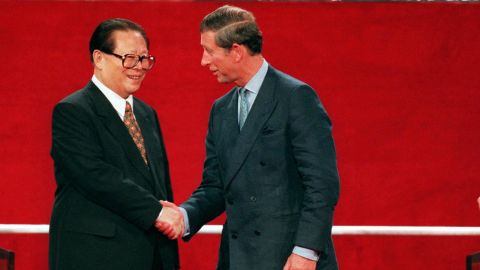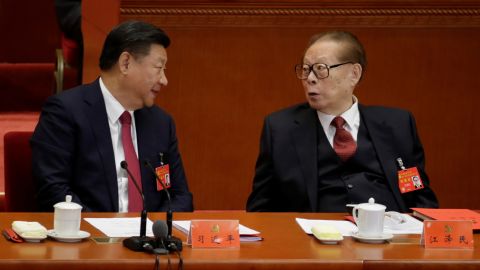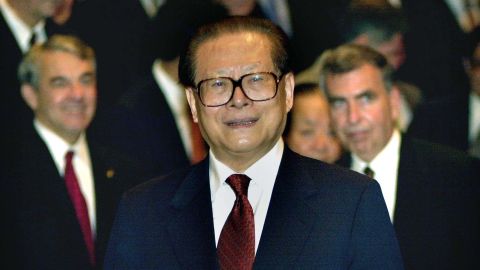Beijing
CNN
—
Chinese Communist Party leader Jiang Zemin, who paved the way for China’s rise as a global superpower, has died, state media Xinhua announced Wednesday. He is 96 years old.
The former general secretary and president of the ruling Communist Party died in Shanghai on Wednesday of leukemia and related multiple organ failure. He is survived by his wife, two sons and two grandchildren.
After being shunned by the West following the Tiananmen Square massacre in 1989, China with Jiang Zemin as its paramount leader successfully reintegrated into the international community, regained sovereignty over Hong Kong, won the 2008 Beijing Olympics, and perhaps most It is important for people to join the WTO.
2005 biography “The Man Who Changed China: The Life and Legacy of Jiang Zemin.”
“In terms of the economic trajectory set, I’m very aware that it was established during that time and became irreversible by the end of his term.”
Still, many observers also believe that Jiang Zemin’s rule sowed the seeds of widespread corruption and remains a lightning rod for mass discontent. While continuing to emphasize one-party rule over political reform, he touted the benefits of “everyone getting quietly rich”.
Initially conceived as a transitional figure, the relatively unknown Jiang Zemin was hand-picked as party leader by then-paramount leader Deng Xiaoping in 1989, the same year a bloody nationwide military crackdown on pro-democracy movements led to the ouster of Zhao Ziyang, the former party leader. leaders sympathize with the protesters.
“Jiang is a contradictory figure and an unexpected leader,” said He Binbin, founder and chief executive of Mingjing Media Group, an influential New York-based publisher of Chinese language books and websites on Chinese politics. “He admired and respected Western culture — but he also had to live within the Chinese political system.”
“He’s not ready to be a thoughtful and visionary leader,” he added. “He just expanded Deng’s rule by implementing Deng’s policies.”
These policies have focused on economic liberalization and globalization, resulting in higher living standards and a widening gap between rich and poor, while maintaining the party’s iron-fisted control over political, ideological and military affairs in the world’s most populous country.

As the former party secretary and mayor of Shanghai, China’s largest city, Jiang Zemin proved to be a shrewder statesman than many predicted, overcoming numerous political opponents within a few years and consolidating the power of the party and military, especially After Deng Xiaoping’s death in 1997, he installed key allies and protégés in the party and government, leading the so-called “Shanghai faction” whose influence outlasted his tenure.
A telling sign of Jiang Zemin’s relative openness and flexibility is that he welcomes private business owners — indeed capitalists — into the Communist Party with open arms. In 2001, a year before he stepped down as leader, Jiang Zemin announced that the party would officially admit entrepreneurs as members, a major move that reinvigorated the party and spurred China’s private sector to flourish.
His rule has also been marked by the government’s ruthless crackdown on Falun Gong, a spiritual movement that Beijing has dubbed a cult. Die-hard followers of the organization have sought Jiang Zemin’s arrest for “crimes against humanity” around the world, often following Chinese leaders during their foreign visits.
Beginning in late 2002, Jiang Zemin handed over the titles to his successor, Hu Jintao, first as party general secretary and then as state president. But he held the military commander-in-chief until 2005, and even after officially retiring, he continued to wield political influence behind the scenes, including over the choice of China’s current leader, Xi Jinping, who recently served an unprecedented third term, paving the way for up the road. The way he reigned throughout his life.
Xi Jinping, the most powerful leader of the People’s Republic of China since its founder Mao Zedong, has purged political rivals including Jiang’s faction. He also reasserted the ruling Communist Party’s dominance of all aspects of Chinese society, removing many of the economic and personal freedoms of the Deng, Jiang and Hu eras.
An unprecedented wave of protests have erupted across China in recent days against the country’s ruthless “zero coronavirus” policy, with some demonstrators in Shanghai calling for Xi to step down. Jiang Zemin’s death comes at a particularly sensitive time, given the history of Chinese people taking to the streets to mourn previous leaders while expressing displeasure with the current government.

Born in eastern China in 1926, Jiang Zemin was educated in pre-communist Shanghai, where he trained as an electrical engineer. He reportedly joined the party at university and studied in the former Soviet Union in the 1950s. He rose through the party ranks, becoming minister of the electronics industry in 1983 and named Shanghai mayor two years later.
Known for wearing heavy black-rimmed glasses, Jiang Zemin was also known for showing off his linguistic and artistic skills — reciting Abraham Lincoln’s Gettysburg Address in English and singing it in Italian in front of foreign dignitaries. “O Sole Mio”.
In May 1997, Jiang said in a one-on-one interview with CNN: “I think, no matter what occupation you are in, if you can enjoy reading some literary works and enjoy some music, it will be very helpful for people’s healthy growth.” .

Jiang Zemin’s flamboyant personality and cosmopolitan flair, while sometimes ridiculed during his reign, have brought him unexpected online popularity in recent years as Chinese social media users increasingly recall him Relatively relaxed political and social atmosphere under the leadership.
Many often refer to his stunning decision in 1997 to authorize a live broadcast on national television of a joint news conference with Bill Clinton, during which he engaged in a heated debate with the visiting US president on human rights in China.
“I think he was underestimated during his lifetime,” said Orville Scheer, a well-known American scholar on China. “Compared to Hu and Xi, he is very talkative, open and friendly.”
“He is one of the few Chinese leaders who wants to be a normal world leader, not a communist dictator.”